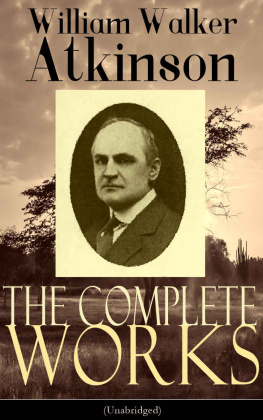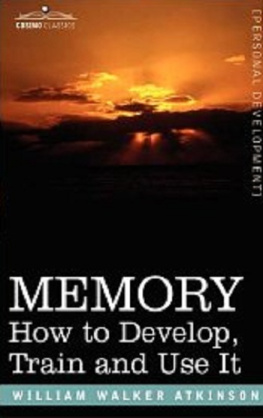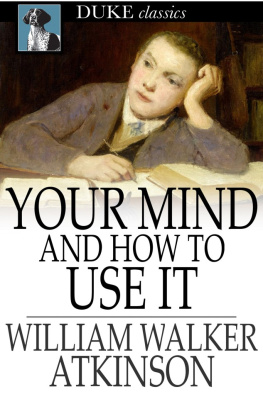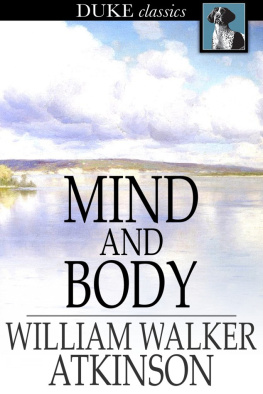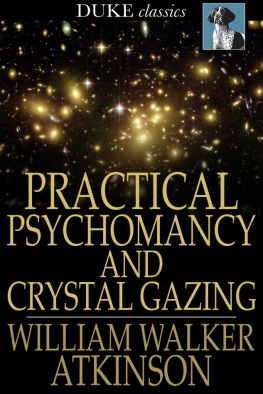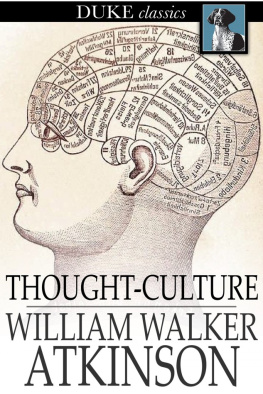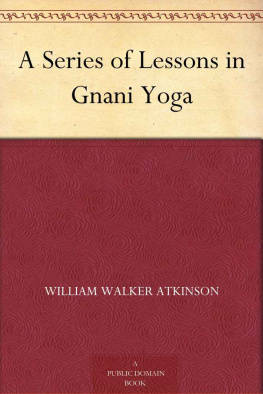William Walker Atkinson
The Complete Works of William Walker Atkinson (Unabridged)
e-artnow, 2016
Contact
ISBN 978-80-268-4787-8
Editorial note: This eBook follows the original text.
Table of Contents
The Art of Expression and The Principles of Discourse
Chapter I.
Expression
IN THE volume of this series entitled The Art of Logical Thinking, we have endeavored to point out to you the rules of logical mentation, and the methods best calculated to develop the faculty of logical thought. In another volume of the same series entitled ThoughtCulture, we have endeavored to instruct you in the principles and methods of developing the several faculties of the mind, so that you may use these faculties as efficient instruments of thought. The purpose of the present volume is that of pointing out to you the approved methods and principles of expressionthe art of expressing the thoughts, ideas, desires and feelings within you.
The term expression is derived from the Latin word expressus, meaning to squeeze out. And even in the present usage the idea of squeezing out, or pressing out as the wine is pressed out from the grape, is present. Expression as used in this connection is defined as: The act of expressing, uttering, declaring, declaration, utterance, representation; representation by words; style of language; the words or language in which a thought is expressed; phraseology, phrase, mode of speech; elocution, diction, or the particular manner or style of utterance appropriate to the subject and sentiment.
The Art of Expression is concerned chiefly with oral expression or speaking, but its rules and principles are equally applicable to expression by writing, or composition. As an authority says of one aspect of rhetoric: It was originally the art of speaking effectively in public, but afterward the meaning was so extended as to comprehend the theory of eloquence, whether spoken or written. * * * Campbell considers the art the same as eloquence, and defines it as That art or talent by which the discourse is adapted to the end, and states that the ends of speaking, or writing are reducible to four: to enlighten the understanding, to please the imagination, to move the passions, or to influence the will. Broadly speaking, its aim is to expound the rules governing speech or written composition, designed to influence the judgment or feelings. It includes, therefore, within its province, accuracy of expression, the structure of periods, and figures of speech.
For our purpose we may consider the Art of Expression as the art of efficient and effective communication between individuals by language. It is not a science, observing, uncovering, discovering, disclosing and classifying, but an art applying the results of prior scientific investigation and classification. As Hill well says: Logic simply teaches the right use of the reason, and may be practiced by the solitary inhabitant of a desert island; but rhetoric (one aspect of the Art of Expression), being the art of communication by language, implies the presence, in fact or in imagination, of at least two personsthe speaker or the writer, and the person spoken to or written to. Aristotle makes the very essence of rhetoric to lie in the distinct recognition of a hearer. Hence its rules are not absolute, like those of logic, but relative to the character and circumstances of those addressed; for though truth is one, and correct reasoning must always be correct, the ways of communicating truth are many. Being the art of communication by language, rhetoric applies to any subject matter that can be treated in words, but has no subject matter peculiar to itself. It does not undertake to furnish a person with something to say; but it does undertake to tell him how best to say that with which he has provided himself.
Before one can successfully apply the Art of Expression, he must first have something to express. In order to express thoughts and ideas, one must first have evolved these thoughts and ideas. As Coleridge well says: Style is the art of conveying the meaning appropriately and with perspicuity, whatever that meaning may be. But some meaning there must be, for in order to form a good style, the primary rule and condition isnot to attempt to express ourselves in language before we thoroughly know our own meaning.
It is not our purpose to attempt to make orators or elocutionists of the readers of this book. The phase of expression which is manifested in public speaking is better taught by the many text books on oratory or elocution, although we shall have something to say regarding the arrangement and general expression of ones ideas that may be useful to the public speaker. Our purpose, however, is rather to impress upon the ordinary individual the methods and principles of correct, clear and forcible expression of his ideas in the ordinary walks of life. Whoever has communication with his fellowmen should learn to express his ideas and thoughts to them in a clear, correct and forcible manner. Not only the man selling goods to others, but also every one who has social or business dealings of any kind with others, should acquire the art whereby he may impress his ideas upon the others forcibly and clearly.
Correct expression results in clear impression; forcible expression results in distinct and deep impression. There is a corresponding impression resulting from every expression. Campbells classification of the four ends of speaking or writing, viz. (1) To enlighten the understanding; (2) to please the imagination; (3) to move the passions; (4) to influence the will; describes the four classes of expression. The results arising from these expressions are always found to be impressions the understanding, imagination, passions or will, respectively are impressed by the respective forms of expression appropriate to each.
Every person expresses himself in some way; often in a very poor way. To some the process of expression is easy and pleasant while for others the words will not flow, and the sentences fail to include the spirit and meaning of the thought or idea behind it. This does not always arise from the fact that the person has no clear ideas or thoughts; for, on the contrary, many very clear thinkers find themselves unable to transmute their ideas into words, and fail to express themselves with the clearness, force and effect to which their mental creations entitle them. There are but few people who do not feel hampered in the expression of their ideas and thoughts by the lack of understanding of the fundamental principles of the Art of Expression. These fundamental principles are simple, and the methods of applying them may be easily acquired.
But it is not our desire or purpose to consider Expression as an art separate and apart from the practical necessities of everyday life and businessas an art concerning itself with grace and beauty rather than with utility. This is a utilitarian agethe test of truth and merit is what is it good for; how will it work; what can we do with it; what is its practical use? And so, in our consideration of the Art of Expression we shall endeavor to remember, first, last and always the demand of the agethe whatcanwedowithit requisite. It is not enough that one should be able to clothe his thoughts in beautiful verbal garb. It is demanded that the clothing of words shall be adapted to well withstand the rough requirements of everyday wear, and of practical usage. Remembering always that expression precedes impression, and that impression is essential to the practical process of communication with others, we shall endeavor to show the forms and methods of expression best adapted to producing the strongest, clearest and most lasting impressions upon the minds of others.

